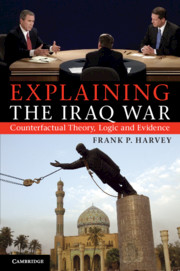Book contents
- Frontmatter
- Contents
- Figures
- Tables
- Acknowledgments
- Introduction
- 1 Comparative counterfactual analysis and the 2003 Iraq war
- 2 Leadership, political context(s) and the Iraq war
- 3 Democratic national security advisers
- 4 Domestic and congressional politics
- 5 American intelligence failures and miscalculations
- 6 Societal pressures and public opinion
- 7 International politics, global WMD consensus and UN power balancing
- 8 Hussein’s mistakes, miscalculations and misperceptions
- 9 Summary and implications
- 10 Conclusion
- Bibliography
- Index
5 - American intelligence failures and miscalculations
Published online by Cambridge University Press: 05 June 2012
- Frontmatter
- Contents
- Figures
- Tables
- Acknowledgments
- Introduction
- 1 Comparative counterfactual analysis and the 2003 Iraq war
- 2 Leadership, political context(s) and the Iraq war
- 3 Democratic national security advisers
- 4 Domestic and congressional politics
- 5 American intelligence failures and miscalculations
- 6 Societal pressures and public opinion
- 7 International politics, global WMD consensus and UN power balancing
- 8 Hussein’s mistakes, miscalculations and misperceptions
- 9 Summary and implications
- 10 Conclusion
- Bibliography
- Index
Summary
Threat manipulation, distortions and exaggerations
In line with a central premise of the Gore-peace counterfactual, neoconists have consistently argued that exaggerated intelligence estimates and threat distortions were directly responsible for generating support for the Iraq war. A Gore administration would likely not have engaged in this kind of threat rhetoric and would have endorsed the generally accepted (non-distorted) impressions of the WMD threat when crafting policy responses. More importantly, a Gore administration would have excluded out-of-power neocons who would not have had access to or control over the selective release of intelligence necessary to engage in the manipulation that led to congressional authorization. The following chapter challenges this standard account of history.
Neoconism clearly asserts that intelligence on Iraq’s WMD was intentionally manipulated by White House and Pentagon officials to obtain the domestic (congressional) and international (UN) support required to justify invasion. Of all pre-war intelligence estimates the Bush administration is accused of exaggerating, neoconists typically focus on the following three items: (1) operational linkages between Saddam and Al-Qaeda leading to 9/11; (2) Saddam’s attempted acquisition of aluminum tubes used in centrifuge enrichment programs; and (3) the attempted purchase of uranium yellowcake from Africa. All three intelligence estimates were shown after the war to be largely baseless and seriously flawed, but these errors, according to neoconists, were known to administration officials yet nonetheless ignored. Congressional leaders, the argument goes, inadvertently relied on these false estimates to defend their support for the October 2002 authorization. And since authorization was a crucial step toward war, the war itself can be blamed on these distortions and on those who were responsible for their fabrication.
- Type
- Chapter
- Information
- Explaining the Iraq WarCounterfactual Theory, Logic and Evidence, pp. 147 - 180Publisher: Cambridge University PressPrint publication year: 2011



